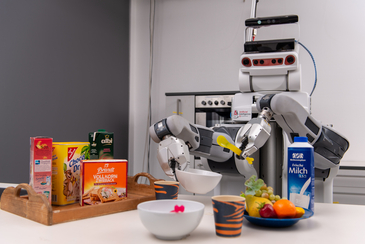In the field of artificial intelligence (AI), four scientists from the University of Bremen are some of the worldwide leading experts. That is the result of the renowned Chinese Tsinghua University ranking.
The ranking lists the 2,000 most influential researchers within 20 categories in the area of artificial intelligence. Professor Michael Beetz was the top-ranking researcher from Bremen, attaining 4th place in the Robotics category. Beetz is the director of the Institute for Artificial Intelligence (IAI) and EASE (Everyday Activity Science and Engineering) Collaborative Research Center (CRC) at the University of Bremen. The center’s research goal is the development of robots that have the ability to complete everyday tasks using human competence, for example cooking or setting a table.
Professor Carsten Lutz from the Faculty of Mathematics/Computer Science appears in two ranking categories: He attained the 30th spot in the “Knowledge Engineering” category and the 94th spot in the interdisciplinary “AAAI/IJCAI” category. The latter category was named after the two largest international AI conferences. Professor Rolf Drechsler, dean of the Faculty of Mathematics/Computer Science, and Dr. Moritz Tenorth from the Institute for Artificial Intelligence were included in the Chip Technologies and Robotics categories. All four work within the EASE CRC.
The University of Bremen also achieved great results within the field of AI in terms of early-career researcher support: Three former PhD students of Professor Beetz were on the Robotics category list: Dr. Radu Rusu (2nd place), Dr. Nico Blodow (22nd place), and Dr. Moritz Tenorth (87th place).
Bremen’s Specialty: Researchers View Robotics and AI Together
“The good results come, amongst other things, from the long-term views of the Bremen AI researchers,” explains Beetz. They try to solve important problems with long-term concepts. “One of our specialties is the holistic approach with which we see robotics and artificial intelligence,” he explains. “We combine classic AI methods with very strong, new methods, such as machine learning, in order to make systems more robust.” One of the aims is to design AI systems in such a manner that the processes are always understandable and can be explained – in contrast to black-box systems, of which the decision-making processes are not comprehensible, according to Beetz.
Bremen Is Positioned Well Internationally
The location Bremen is positioned well internationally in terms of AI-based robotics. The interdisciplinary foundation research in the EASE CRC is optimally complemented by the application-oriented research of the German Research Center for Artificial Intelligence (DFKI) and the Knowledge4Retail consortium. The DFKI is the leader in the area of space and underwater robotics. The Knowledge4Retail network is one of the winners of the Artificial Intelligence Innovation Competition, which was held by the Federal Ministry for Economic Affairs and Energy (BMWi) last year.
Ranking List Background Information
Tsinghua University uses “ArnetMiner” in order to produce the ranking list. ArnetMiner is a so-called data mining service, which can analyze large quantities of scientific data. The system was developed within the frame of a research project and has been in use for the past three years. As an example, ArnetMiner makes it possible to search for experts in a particular field, analyze the networks between scientists, and also estimate the influence of their scientific work on the specific field. The system now holds more than 130 million scientists, 270 million publications, and 750 million citations.
Further information:
https://ease-crc.org
https://knowledge4retail.org/en/home-2/
https://www.uni-bremen.de/en/fb3/
https://robotik.dfki-bremen.de/en/startpage.html
www.uni-bremen.de/en/
The rankings of the most successful German AI scientists can be found here: www.aminer.cn/ai2000/country/Germany
Robotics rankings website:
Axel Kölling
Contact:
Prof.Dr. Michael Beetz
Institute for Artificial Intelligence
University of Bremen
Phone: +49-421 218-64001
Email: beetzprotect me ?!cs.uni-bremenprotect me ?!.de


